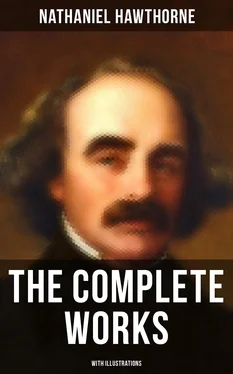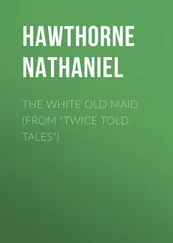Queer, indeed, they looked! Chanticleer himself, though stalking on two stilt-like legs, with the dignity of interminable descent in all his gestures, was hardly bigger than an ordinary partridge; his two wives were about the size of quails; and as for the one chicken, it looked small enough to be still in the egg, and, at the same time, sufficiently old, withered, wizened, and experienced, to have been founder of the antiquated race. Instead of being the youngest of the family, it rather seemed to have aggregated into itself the ages, not only of these living specimens of the breed, but of all its forefathers and foremothers, whose united excellences and oddities were squeezed into its little body. Its mother evidently regarded it as the one chicken of the world, and as necessary, in fact, to the world’s continuance, or, at any rate, to the equilibrium of the present system of affairs, whether in church or state. No lesser sense of the infant fowl’s importance could have justified, even in a mother’s eyes, the perseverance with which she watched over its safety, ruffling her small person to twice its proper size, and flying in everybody’s face that so much as looked towards her hopeful progeny. No lower estimate could have vindicated the indefatigable zeal with which she scratched, and her unscrupulousness in digging up the choicest flower or vegetable, for the sake of the fat earthworm at its root. Her nervous cluck, when the chicken happened to be hidden in the long grass or under the squash-leaves; her gentle croak of satisfaction, while sure of it beneath her wing; her note of ill-concealed fear and obstreperous defiance, when she saw her arch-enemy, a neighbor’s cat, on the top of the high fence, — one or other of these sounds was to be heard at almost every moment of the day. By degrees, the observer came to feel nearly as much interest in this chicken of illustrious race as the mother-hen did.
Phoebe, after getting well acquainted with the old hen, was sometimes permitted to take the chicken in her hand, which was quite capable of grasping its cubic inch or two of body. While she curiously examined its hereditary marks, — the peculiar speckle of its plumage, the funny tuft on its head, and a knob on each of its legs, — the little biped, as she insisted, kept giving her a sagacious wink. The daguerreotypist once whispered her that these marks betokened the oddities of the Pyncheon family, and that the chicken itself was a symbol of the life of the old house, embodying its interpretation, likewise, although an unintelligible one, as such clews generally are. It was a feathered riddle; a mystery hatched out of an egg, and just as mysterious as if the egg had been addle!
The second of Chanticleer’s two wives, ever since Phoebe’s arrival, had been in a state of heavy despondency, caused, as it afterwards appeared, by her inability to lay an egg. One day, however, by her self-important gait, the sideways turn of her head, and the cock of her eye, as she pried into one and another nook of the garden, — croaking to herself, all the while, with inexpressible complacency, — it was made evident that this identical hen, much as mankind undervalued her, carried something about her person the worth of which was not to be estimated either in gold or precious stones. Shortly after, there was a prodigious cackling and gratulation of Chanticleer and all his family, including the wizened chicken, who appeared to understand the matter quite as well as did his sire, his mother, or his aunt. That afternoon Phoebe found a diminutive egg, — not in the regular nest, it was far too precious to be trusted there, — but cunningly hidden under the currant-bushes, on some dry stalks of last year’s grass. Hepzibah, on learning the fact, took possession of the egg and appropriated it to Clifford’s breakfast, on account of a certain delicacy of flavor, for which, as she affirmed, these eggs had always been famous. Thus unscrupulously did the old gentlewoman sacrifice the continuance, perhaps, of an ancient feathered race, with no better end than to supply her brother with a dainty that hardly filled the bowl of a teaspoon! It must have been in reference to this outrage that Chanticleer, the next day, accompanied by the bereaved mother of the egg, took his post in front of Phoebe and Clifford, and delivered himself of a harangue that might have proved as long as his own pedigree, but for a fit of merriment on Phoebe’s part. Hereupon, the offended fowl stalked away on his long stilts, and utterly withdrew his notice from Phoebe and the rest of human nature, until she made her peace with an offering of spicecake, which, next to snails, was the delicacy most in favor with his aristocratic taste.
We linger too long, no doubt, beside this paltry rivulet of life that flowed through the garden of the Pyncheon House. But we deem it pardonable to record these mean incidents and poor delights, because they proved so greatly to Clifford’s benefit. They had the earth-smell in them, and contributed to give him health and substance. Some of his occupations wrought less desirably upon him. He had a singular propensity, for example, to hang over Maule’s well, and look at the constantly shifting phantasmagoria of figures produced by the agitation of the water over the mosaic-work of colored pebbles at the bottom. He said that faces looked upward to him there, — beautiful faces, arrayed in bewitching smiles, — each momentary face so fair and rosy, and every smile so sunny, that he felt wronged at its departure, until the same flitting witchcraft made a new one. But sometimes he would suddenly cry out, “The dark face gazes at me!” and be miserable the whole day afterwards. Phoebe, when she hung over the fountain by Clifford’s side, could see nothing of all this, — neither the beauty nor the ugliness, — but only the colored pebbles, looking as if the gush of the waters shook and disarranged them. And the dark face, that so troubled Clifford, was no more than the shadow thrown from a branch of one of the damson-trees, and breaking the inner light of Maule’s well. The truth was, however, that his fancy — reviving faster than his will and judgment, and always stronger than they — created shapes of loveliness that were symbolic of his native character, and now and then a stern and dreadful shape that typified his fate.
On Sundays, after Phoebe had been at church, — for the girl had a church-going conscience, and would hardly have been at ease had she missed either prayer, singing, sermon, or benediction, — after church-time, therefore, there was, ordinarily, a sober little festival in the garden. In addition to Clifford, Hepzibah, and Phoebe, two guests made up the company. One was the artist Holgrave, who, in spite of his consociation with reformers, and his other queer and questionable traits, continued to hold an elevated place in Hepzibah’s regard. The other, we are almost ashamed to say, was the venerable Uncle Venner, in a clean shirt, and a broadcloth coat, more respectable than his ordinary wear, inasmuch as it was neatly patched on each elbow, and might be called an entire garment, except for a slight inequality in the length of its skirts. Clifford, on several occasions, had seemed to enjoy the old man’s intercourse, for the sake of his mellow, cheerful vein, which was like the sweet flavor of a frostbitten apple, such as one picks up under the tree in December. A man at the very lowest point of the social scale was easier and more agreeable for the fallen gentleman to encounter than a person at any of the intermediate degrees; and, moreover, as Clifford’s young manhood had been lost, he was fond of feeling himself comparatively youthful, now, in apposition with the patriarchal age of Uncle Venner. In fact, it was sometimes observable that Clifford half wilfully hid from himself the consciousness of being stricken in years, and cherished visions of an earthly future still before him; visions, however, too indistinctly drawn to be followed by disappointment — though, doubtless, by depression — when any casual incident or recollection made him sensible of the withered leaf.
Читать дальше












